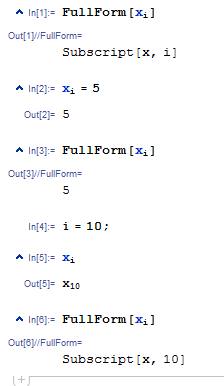##Lingering Definitions: when calculations go bad##
One aspect of *Mathematica* that sometimes confuses new users, and has confused me often enough, is the _Lingering Definition Problem_. *Mathematica* diligently **accumulates all definitions** (functions, variables, etc.) during a session, and they remain in effect in the memory **until explicitly cleared/removed**. Here's a quick experiment you can do, to see the problem clearly.
1: Launch (or re-launch) *Mathematica*, create a new notebook, and evaluate the following expression:
x = 2 + 2
![x = 2 + 2][1]
2: Now close the notebook document without saving (and without quitting *Mathematica*), and create another fresh notebook. Evaluate this:
x
![x][2]
The result can be surprising to beginners - after all, you think you've just removed all visible traces of `x`, closing the only notebook with any record of it, and yet, it still exists, and still has the value 4.
To explain this, you need to know that when you launch the *Mathematica* application, you're launching two linked but separate components: the visible _front-end_, which handles the notebooks and user interaction, and the invisible _kernel_, which is the programming engine that underpins the *Mathematica* system. The notebook interface is like the flight deck or operating console, and the kernel is like the engine, hidden away but ready to provide the necessary power.
So, what happened when you typed the expression `x = 2 + 2`, is that the **front-end** sent it to the **kernel** for evaluation, and received the result back from the kernel for display. The resulting symbol, and its value, is now part of the kernel. You can close documents and open new ones, but the kernel's knowledge of the symbol `x` is unaffected, until something happens to change that.
And it's these lingering definitions that can confuse you - symbols that are not visible in your current notebook *are still present and defined* in the kernel, and might affect your current evaluations.
This also affects subscripted expressions - consider the following evaluation, where the initially innocent symbol `i` is assigned an explicit value:

If you want to use subscripted symbols in a more robust fashion, you should use e.g. the [Notation package](http://reference.wolfram.com/mathematica/Notation/guide/NotationPackage.html).
There are a couple of things you can learn to do to avoid problems caused by Lingering Definitions. Before you provide definitions for specific symbols, clear any existing values that you've defined so far in the session, with the `Clear` function.
Clear[x]
Or you can clear all symbols in the global context, using `ClearAll`.
ClearAll["Global`*"]
When all else fails, quit the kernel (choose **Evaluation** > **Quit Kernel** from the menu or type `Quit[]`, thereby forgetting all the symbols (and everything else) that you've defined in the kernel.
Some further notes:
- *Mathematica* offers a way to keep the namespaces of your notebooks separate, so that they don't share the same symbols ([see here][3]).
- *Mathematica* does have garbage collection, but most of the time you don't have to care about it being completely automatic.
- Some dynamic variables can remain in effect even if the kernel is quit, as such variables are owned by the frontend. Be sure to remove all generated dynamic cells (via the menu option **Cell** > **Delete All Ouput**) before quitting/restarting the kernel.
[1]: https://i.sstatic.net/C0qfR.png
[2]: https://i.sstatic.net/Xklpf.png
[3]: http://mathematica.stackexchange.com/questions/853/is-there-a-way-to-separate-variables-between-multiple-notebooks